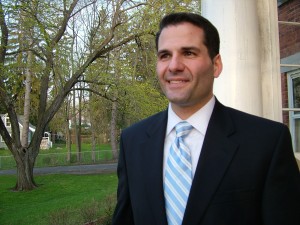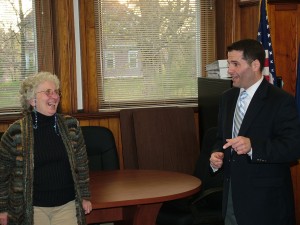
Marc Molinaro”™s 103rd Assembly district runs from East Fishkill to the northern reaches of Columbia County. He first made news in 1994 when, at age 18, he was elected to the Tivoli Board of Trustees. Still without gray some 17 years later, he clearly maintains shortstoplike enthusiasm for elected life.
On April 25, he told members of the Washington Town Board and the Millbrook Village Board, plus a number of interested residents, about Albany”™s recent budget accomplishments, part of a district-wide budget tour he is conducting. The presentation featured a couple of hot topics currently in limbo: a property tax cap and reform, perhaps via a forensic audit, of the MTA”™s unpopular commuter tax.
Saying he did not have the to-the-penny figures with him, Molinaro, a Republican, nonetheless said Dutchess County residents contribute about $16,000 each to the MTA while Connecticut residents contribute about $4,000. He favors a forensic audit, but said the New York City-dominated Assembly is balking.
The Assembly likewise is balking at capping school and local property taxes at 2 percent annually. The initiative has passed the Senate. Molinaro said he expects a lot of serious horse trading when the Assembly takes up the measure, with New York City rent control in play: “That will be a real battle,” he said.
Molinaro said New York”™s recent tax record reflects an 8 percent uptick every year. “We cannot withstand or sustain those increases,” he said, noting the budget approved a day early this year includes a 2 percent reduction in spending. That budget will include a hit to be endured by the budget-minded members of the audience: an average 2 percent decline in state revenues for towns such as Washington and villages like Millbrook.
The state Senate has already approved a 2 percent property tax cap. Molinaro used the term “held hostage” to reflect where it stands in his chamber, the Assembly. Critics of the tax cap have said it unfairly shackles governments, preventing them from reacting to unforeseen needs. But Molinaro laid out an asterisk with which most in the audience were unfamiliar. As the legislation is currently fashioned, town and village boards would need a two-thirds majority to change the rules for a local budget. School boards also could break through a 2-percent ceiling if they can convince two-thirds of voters to up the rate. That is in keeping with standard budgetary practices, where residents approve school spending, but local boards alone sign off on their budgets.
Molinaro said the new scheme makes sense because local constituencies are better attuned to their needs than is Albany. “I suspect we”™ll have a tax cap,” he said.

Washington Town Supervisor Florence “Fussy” Prisco asked a question for many when she said, “Will there honestly be mandate relief?”
Molinaro set mandate relief on a 1-to-10 scale, saying his team began at one.
“Can you get to three?” Prisco asked.
Molinaro, who spoke for nearly an hour without notes, said he thought so.
Gov. Andrew Cuomo has created three “teams” to battle for reform on three fronts: Medicaid, state government and mandates. Molinaro is one of 22 members on the mandate-relief team.
Cuomo favored the word “team” over “committee” Molinaro said, but Molinaro”™s team felt cheated when the governor rushed to publish an initial mandate-relief report March 1 before the team members had read and commented on it. Molinaro said he reminded the governor that”™s not how teams work. “It was a hurried, lackluster start,” he said, adding, “We”™re reviewing countless mandate-relief proposals. Everything from posting speed limits to Medicaid is mandate based; that”™s a huge range.”
The mandate team continues to gather input online from both municipalities and from individuals.
Molinaro said enormous corporations like IBM are only a part of the economic equation and not necessarily the goal of economic incentives. “We need to grow the mid-level companies. These are companies with 500 to 1,000 to 1,500 employees. Right now, they”™re going across the border. Companies like IBM are worried about China. We”™re worried about Ohio, Pennsylvania and Georgia, or even across the river to Ulster County to get out from under the MTA tax.” Molinaro favors an audit of the MTA.
As for grants, Molinaro advised get ”™em while you can. “Grants are not disappearing. They”™re already approved as debt on the books. The structures already exist. Some tell me it is all taxpayer money. And it is; it”™s coming out of somebody”™s pocket. But you don”™t have to ask about that. And if you don”™t get it, somebody else will get it.”
Molinaro said he personally controlled the purse strings on $125,000 in discretionary spending while Silver controlled $6 million.
The issue of hydraulic fracturing to release natural gas from shale ”“ fracking ”“ arrived via a question from the assembled.
Molinaro advised going very slowly on the controversial practice. “If you contaminate the air and the water, you only get to make that mistake once.” He left open the possibility of fracking in places near the New York-Pennsylvania border that may already have been impacted by the practice a farm field away in the Keystone State.
Molinaro is looking to fill the county executive seat being vacated by William Steinhaus in November. He shared a laugh, saying for the first time in his political life he might not be the youngest candidate on the ballot.



















